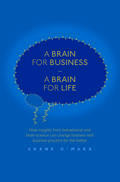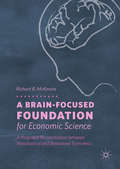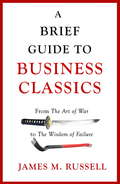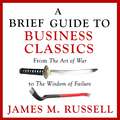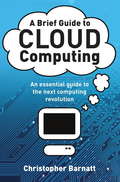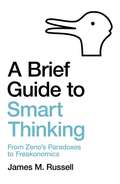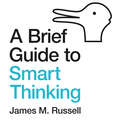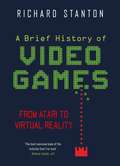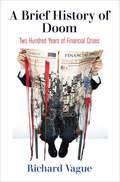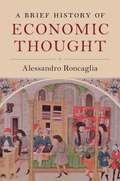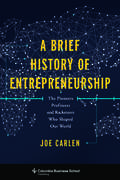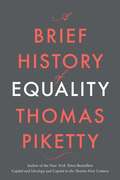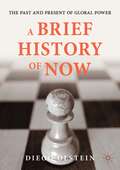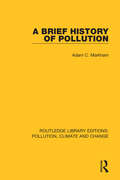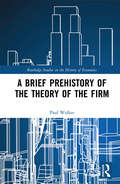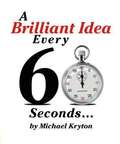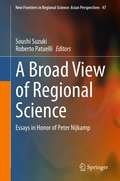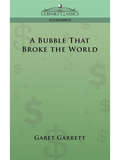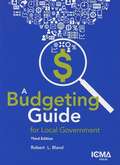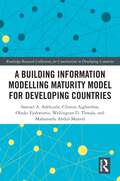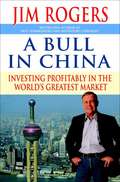- Table View
- List View
A Brain for Business – A Brain for Life
by Shane O'MaraBehaviour change is hard, but O’Mara shows that by adopting strategies that are well-founded in the science of brain and behaviour individuals and organisations can adapt to the demands of the modern world.The brain matters in business. The problem is that our brains have many biases, heuristics and predilections that can distort behaviour and decision making. The good news is that we know more about how these work than ever before. O’Mara’s starting point is that, as our behaviour arises from the structure and function of our brains, careful examination of a series of brain–based (‘neurocognitive’) analyses of common aspects of human behaviour relevant to business and management practice reveals lessons that can be used at work. He begins by looking at neuroplasticity and how it is enables a shift from a restrictive ‘fixed mindset’ to an enabling ‘growth mindset’. He shows how this changing mindset approach – where the focus is on task and improvements based on effort – is scalable within organisations. Next, as the brain is a living organ like the heart and lungs, O’Mara shows how to keep it physically in the best possible shape before examining how we exercise control over our behaviour, build resilience and create positive brain states. He also considers the implications for business of our brains wiring for status and illustrates how research shows that it is possible to de-bias assumptions about gender and race – and the impact that this has on performance.
A Brain-Focused Foundation for Economic Science: A Proposed Reconciliation between Neoclassical and Behavioral Economics
by Richard B. McKenzieThis book argues that Lionel Robbins’s construction of the economics field’s organizing cornerstone, scarcity—and all that has been derived from it from economists in Robbins’s time to today—no longer can generate general consent among economists. Since Robbins’ Essay, economists have learned more than Robbins and his cohorts could have imagined about human decision making and about the human brain that is the lynchpin of human decision making. This book argues however that behavioral economists and neuroeconomists, in pointing to numerous ways people fall short of perfectly rational decisions (anomalies, biases, and downright errors), have saved conventional economics from such self-contradictions in what could be viewed as a wayward approach. This book posits that the human brain is the ultimate scarce resource, and that a focus on the brain can bring a new foundation for economics and can save the discipline from hostile criticisms from a variety of non-economists (many psychologists).
A Brief Guide to Business Classics: From The Art of War to The Wisdom of Failure
by James M. RussellThe world of business books is a curious place where one can find everyone from great businesspeople like Warren Buffett, Steve Jobs and Elon Musk, to the most spectacular business failures such as Enron and the sub-prime business market. There are geniuses, hard workers, academics and entrepreneurs as well a few charlatans and hucksters. There's even room for Donald Trump. The 70 titles covered were chosen with various parameters in mind: to cover a range of areas of business, from sales and marketing to negotiation, entrepreneurship to investing, leadership to innovation, and from traditional and corporate models of business to start-up manuals and alternative angles on the subject. Obvious bestselling titles such as How to Make Friends and Influence People or 7 Habits of Highly Effective People have been included, but there are also those books of more questionable value often included on recommended lists of business classics, included here by way of warning. The chosen books also cover a wide span of time and acknowledge that some of the most powerful or entertaining insights into business can be found in texts that aren't perceived as being 'business books', for instance The Art of War, Microserfs, Thinking Fast and Slow and The Wealth of Nations. The selection includes a good range of the most recent successes in business publishing with which readers may be less familiar. The titles are arranged chronologically, allowing the reader to dip in, but also casting an intriguing light on how trends in business titles have changed over the years. Among these titles, you will find expert advice, based on solid research (for instance The Effective Executive or Getting to Yes), and inspirational guides to setting up businesses and running them on sound foundations (such as True North, Crucial Conversations, or We) alongside dubious management manuals that take a single flawed idea and stretch it out to the point of absurdity. The hope is that the reader will be inspired to read the best of these titles, ignore the worst of them, and will come away with at least a basic idea of what each has to teach us about business.
A Brief Guide to Business Classics: From The Art of War to The Wisdom of Failure
by James M. RussellThe world of business books is a curious place where one can find everyone from great businesspeople like Warren Buffett, Steve Jobs and Elon Musk, to the most spectacular business failures such as Enron and the sub-prime business market. There are geniuses, hard workers, academics and entrepreneurs as well a few charlatans and hucksters. There's even room for Donald Trump. The 70 titles covered were chosen with various parameters in mind: to cover a range of areas of business, from sales and marketing to negotiation, entrepreneurship to investing, leadership to innovation, and from traditional and corporate models of business to start-up manuals and alternative angles on the subject. Obvious bestselling titles such as How to Make Friends and Influence People or 7 Habits of Highly Effective People have been included, but there are also those books of more questionable value often included on recommended lists of business classics, included here by way of warning. The chosen books also cover a wide span of time and acknowledge that some of the most powerful or entertaining insights into business can be found in texts that aren't perceived as being 'business books', for instance The Art of War, Microserfs, Thinking Fast and Slow and The Wealth of Nations. The selection includes a good range of the most recent successes in business publishing with which readers may be less familiar. The titles are arranged chronologically, allowing the reader to dip in, but also casting an intriguing light on how trends in business titles have changed over the years. Among these titles, you will find expert advice, based on solid research (for instance The Effective Executive or Getting to Yes), and inspirational guides to setting up businesses and running them on sound foundations (such as True North, Crucial Conversations, or We) alongside dubious management manuals that take a single flawed idea and stretch it out to the point of absurdity. The hope is that the reader will be inspired to read the best of these titles, ignore the worst of them, and will come away with at least a basic idea of what each has to teach us about business.
A Brief Guide to Cloud Computing: An essential guide to the next computing revolution. (Brief Histories)
by Christopher BarnattAn accessible and comprehensive guide to the future of computing.Cloud Computing is the next computing revolution and will have as much impact on your life as the introduction of the PC. Using websites including Facebook, Flickr and Gmail, many people already store some information out in the Internet cloud. However, within a few years most computing applications will be accessed online with the web at the heart of everything we do.In this valuable guide, expert Christopher Barnatt explains how computing will rapidly become more reliable, less complex, and more environmentally friendly. He explores online software and hardware, and how it will alter our office work and personal lives. Individuals and companies are going to be released from the constraints of desktop computing and expensive corporate data centres. New services like augmented reality will also become available.Including coverage of Google Docs, Zoho, Microsoft Azure, Amazon EC2 and other key developments, this book is your essential guide to the cloud computing revolution.
A Brief Guide to Smart Thinking: From Zeno's Paradoxes to Freakonomics
by James M. RussellEach book is summarised to convey a brief idea of what each one has to offer the interested reader, while a 'Speed Read' for each book delivers a quick sense of what each book is like to read and a highly compressed summary of the main points of the book in question. The titles covered include thought-provoking classics on psychology, mindfulness, rationality, the brain, mathematical and economic thought and practical philosophy. The selection includes books about self-improvement as well as historically interesting accounts of how the mind works. Titles included go back as far as the Epictetus classic TheEnchiridion and Bertrand Russell's charming TheABC of Relativity, and proceed through classics such as Edward de Bono's Lateral Thinking and into the digital era with titles such as The Shallows and Big Data. The books are arranged chronologically, which draws attention to some of the interesting juxtapositions and connections between them. Some of the titles included are: Freakonomics, by Steven D. Levitt; Blink: The Power of Thinking Without Thinking, by Malcolm Gladwell; Sapiens: A Brief History of Humankind, by Yuval Noah Harari; The Organized Mind: Thinking Straight in the Age of Information Overload, by Daniel J. Levitin; The Descent of Man, by Grayson Perry; How the Mind Works, by Steven Pinker; Black Box Thinking: Why Some People Never Learn from Their Mistakes - But Some Do, by Matthew Syed; We Should All Be Feminists, by Chimamanda Ngozi Adichie; Guns, Germs, and Steel: The Fates of Human Societies, by Jared Diamond; The Black Swan: The Impact of the Highly Improbable, by Nassim Nicholas Taleb; Man's Search for Meaning, by Viktor E. Frankl; The News: A User's Manual, by Alain de Botton; Mindware: Tools for Smart Thinking, by Richard E. Nisbett; The ABC of Relativity, by Bertrand Russell; The Psychopath Test, by Jon Ronson; The Path: What Chinese Philosophers Can Teach Us About the Good Life, by Michael Puett; A Brief History of Time, by Stephen Hawking; Messy: The Power of Disorder to Transform Our Lives, by Tim Harford; Big Data: A Revolution That Will Transform How We Live, Work, and Think, by Viktor Mayer-Schönberger; Moneyball: The Art of Winning an Unfair Game, by Michael Lewis; The Survivors Club: The Secrets and Science That Could Save Your Life, by Ben Sherwood; Black Box Thinking, by Matthew Syed; Chaos: Making a New Science, by James Gleick; A Short History of Nearly Everything, by Bill Bryson; The Shallows: What the Internet Is Doing to Our Brains, by Nicholas Carr; Making Ideas Happen: Overcoming the Obstacles Between Vision and Reality, by Scott Belsky; The Enchiridion, by Epictetus; Gödel, Escher, Bach, by Douglas R. Hofstadter; What I Talk About When I Talk About Running, by Haruki Murakami; and Lateral Thinking, by Edward de Bono.
A Brief Guide to Smart Thinking: From Zeno's Paradoxes to Freakonomics
by James M. RussellEach book is summarised to convey a brief idea of what each one has to offer the interested reader, while a 'Speed Read' for each book delivers a quick sense of what each book is like to read and a highly compressed summary of the main points of the book in question. The titles covered include thought-provoking classics on psychology, mindfulness, rationality, the brain, mathematical and economic thought and practical philosophy. The selection includes books about self-improvement as well as historically interesting accounts of how the mind works. Titles included go back as far as the Epictetus classic The Enchiridion and Bertrand Russell's charming The ABC of Relativity, and proceed through classics such as Edward de Bono's Lateral Thinking and into the digital era with titles such as The Shallows and Big Data. The books are arranged chronologically, which draws attention to some of the interesting juxtapositions and connections between them. Some of the titles included are: Freakonomics, by Steven D. Levitt; Blink: The Power of Thinking Without Thinking, by Malcolm Gladwell; Sapiens: A Brief History of Humankind, by Yuval Noah Harari; The Organized Mind: Thinking Straight in the Age of Information Overload, by Daniel J. Levitin; The Descent of Man, by Grayson Perry; How the Mind Works, by Steven Pinker; Black Box Thinking: Why Some People Never Learn from Their Mistakes - But Some Do, by Matthew Syed; We Should All Be Feminists, by Chimamanda Ngozi Adichie; Guns, Germs, and Steel: The Fates of Human Societies, by Jared Diamond; The Black Swan: The Impact of the Highly Improbable, by Nassim Nicholas Taleb; Man's Search for Meaning, by Viktor E. Frankl; The News: A User's Manual, by Alain de Botton; Mindware: Tools for Smart Thinking, by Richard E. Nisbett; The ABC of Relativity, by Bertrand Russell; The Psychopath Test, by Jon Ronson; The Path: What Chinese Philosophers Can Teach Us About the Good Life, by Michael Puett; A Brief History of Time, by Stephen Hawking; Messy: The Power of Disorder to Transform Our Lives, by Tim Harford; Big Data: A Revolution That Will Transform How We Live, Work, and Think, by Viktor Mayer-Schönberger; Moneyball: The Art of Winning an Unfair Game, by Michael Lewis; The Survivors Club: The Secrets and Science That Could Save Your Life, by Ben Sherwood; Black Box Thinking, by Matthew Syed; Chaos: Making a New Science, by James Gleick; A Short History of Nearly Everything, by Bill Bryson; The Shallows: What the Internet Is Doing to Our Brains, by Nicholas Carr; Making Ideas Happen: Overcoming the Obstacles Between Vision and Reality, by Scott Belsky; The Enchiridion, by Epictetus; Gödel, Escher, Bach, by Douglas R. Hofstadter; What I Talk About When I Talk About Running, by Haruki Murakami; and Lateral Thinking, by Edward de Bono.
A Brief Guide to Smart Thinking: From Zeno’s Paradoxes to Freakonomics
by James M. RussellEach book is summarised to convey a brief idea of what each one has to offer the interested reader, while a 'Speed Read' for each book delivers a quick sense of what each book is like to read and a highly compressed summary of the main points of the book in question. The titles covered include thought-provoking classics on psychology, mindfulness, rationality, the brain, mathematical and economic thought and practical philosophy. The selection includes books about self-improvement as well as historically interesting accounts of how the mind works. Titles included go back as far as the Epictetus classic The Enchiridion and Bertrand Russell's charming The ABC of Relativity, and proceed through classics such as Edward de Bono's Lateral Thinking and into the digital era with titles such as The Shallows and Big Data. The books are arranged chronologically, which draws attention to some of the interesting juxtapositions and connections between them. Some of the titles included are: Freakonomics, by Steven D. Levitt; Blink: The Power of Thinking Without Thinking, by Malcolm Gladwell; Sapiens: A Brief History of Humankind, by Yuval Noah Harari; The Organized Mind: Thinking Straight in the Age of Information Overload, by Daniel J. Levitin; The Descent of Man, by Grayson Perry; How the Mind Works, by Steven Pinker; Black Box Thinking: Why Some People Never Learn from Their Mistakes - But Some Do, by Matthew Syed; We Should All Be Feminists, by Chimamanda Ngozi Adichie; Guns, Germs, and Steel: The Fates of Human Societies, by Jared Diamond; The Black Swan: The Impact of the Highly Improbable, by Nassim Nicholas Taleb; Man's Search for Meaning, by Viktor E. Frankl; The News: A User's Manual, by Alain de Botton; Mindware: Tools for Smart Thinking, by Richard E. Nisbett; The ABC of Relativity, by Bertrand Russell; The Psychopath Test, by Jon Ronson; The Path: What Chinese Philosophers Can Teach Us About the Good Life, by Michael Puett; A Brief History of Time, by Stephen Hawking; Messy: The Power of Disorder to Transform Our Lives, by Tim Harford; Big Data: A Revolution That Will Transform How We Live, Work, and Think, by Viktor Mayer-Schönberger; Moneyball: The Art of Winning an Unfair Game, by Michael Lewis; The Survivors Club: The Secrets and Science That Could Save Your Life, by Ben Sherwood; Black Box Thinking, by Matthew Syed; Chaos: Making a New Science, by James Gleick; A Short History of Nearly Everything, by Bill Bryson; The Shallows: What the Internet Is Doing to Our Brains, by Nicholas Carr; Making Ideas Happen: Overcoming the Obstacles Between Vision and Reality, by Scott Belsky; The Enchiridion, by Epictetus; Gödel, Escher, Bach, by Douglas R. Hofstadter; What I Talk About When I Talk About Running, by Haruki Murakami; and Lateral Thinking, by Edward de Bono.
A Brief History Of Video Games: From Atari to Virtual Reality (Brief Histories)
by Rich Stanton'Stanton writes with terrific verve and precision . . . his understanding of the seductive pleasures of gaming takes us right to its heart.'Maria Bustillos, Times Literary Supplement'The best overview book of the industry that I've read.'Andrew Liptak, io9From the first wood-panelled Pong machines in California to the masterpieces of engineering that now sit in countless homes all over the world, A Brief History of Video Games reveals the vibrant history and culture of interactive entertainment. Above all, this is a book about the games - how the experience of playing has developed from simple, repetitive beginnings into a cornucopia of genres and styles, at once utterly immersive and socially engaging. With full-colour illustrations throughout, it shows how technological advances have transformed the first dots and dashes of bored engineers into sophisticated, responsive worlds that are endlessly captivating. As thrilling and surprising as the games it describes, this is an indispensable read for anyone serious about the business of having fun.
A Brief History of Doom: Two Hundred Years of Financial Crises (Haney Foundation Series)
by Richard VagueFinancial crises happen time and again in post-industrial economies—and they are extraordinarily damaging. Building on insights gleaned from many years of work in the banking industry and drawing on a vast trove of data, Richard Vague argues that such crises follow a pattern that makes them both predictable and avoidable.A Brief History of Doom examines a series of major crises over the past 200 years in the United States, Great Britain, Germany, France, Japan, and China—including the Great Depression and the economic meltdown of 2008. Vague demonstrates that the over-accumulation of private debt does a better job than any other variable of explaining and predicting financial crises. In a series of clear and gripping chapters, he shows that in each case the rapid growth of loans produced widespread overcapacity, which then led to the spread of bad loans and bank failures. This cycle, according to Vague, is the essence of financial crises and the script they invariably follow.The story of financial crisis is fundamentally the story of private debt and runaway lending. Convinced that we have it within our power to break the cycle, Vague provides the tools to enable politicians, bankers, and private citizens to recognize and respond to the danger signs before it begins again.
A Brief History of Economic Thought
by Alessandro RoncagliaThe evolution of economic thought can be traced back from its beginnings in classical antiquity up to the present day. In this book, Professor Alessandro Roncaglia offers a clear, concise and updated version of his award-winning The Wealth of Ideas, studying the development of economic thought through perspectives and debates on the economy and society over time. With chapters on prominent economic theorists, including William Petty, Karl Marx, and John Maynard Keynes, as well as on other important figures and key debates of each period, Roncaglia critically evaluates the foundations of the marginalist-neoclassical (scarcity-utility) approach in comparison to the Classical-Keynes approach. A comprehensive guide to the history of economic thought, this book will be of value not only to undergraduate and postgraduate students studying economic thought, but also to any readers desiring to study how economics has evolved up to the present day.
A Brief History of Entrepreneurship: The Pioneers, Profiteers, and Racketeers Who Shaped Our World (Columbia Business School Publishing)
by Joe CarlenA Brief History of Entrepreneurship charts how the pursuit of profit by private individuals has been a prime mover in revolutionizing civilization. Entrepreneurs often butt up against processes, technologies, social conventions, and even laws. So they circumvent, innovate, and violate to obtain what they want. This creative destruction has brought about overland and overseas trade, colonization, and a host of revolutionary technologies—from caffeinated beverages to the personal computer—that have transformed society.Consulting rich archival sources, including some that have never before been translated, Carlen maps the course of human history through nine episodes when entrepreneurship reshaped our world. Highlighting the most colorful characters of each era, he discusses Mesopotamian merchants' creation of the urban market economy; Phoenician merchant-sailors intercontinental trade, which came to connect Africa, Asia, and Europe; Chinese tea traders' invention of paper money; the colonization of the Americas; and the current "flattening" of the world's economic playing field. Yet the pursuit of profit hasn't always moved us forward. From slavery to organized crime, Carlen explores how entrepreneurship can sometimes work at the expense of others. He also discusses the new entrepreneurs who, through the nascent space tourism industry, are leading humanity to a multiplanetary future. By exploring all sides of this legacy, Carlen brings much-needed detail to the role of entrepreneurship in revolutionizing civilization.
A Brief History of Equality
by Thomas PikettyThe world’s leading economist of inequality presents a short but sweeping and surprisingly optimistic history of human progress toward equality despite crises, disasters, and backsliding. A perfect introduction to the ideas developed in his monumental earlier books. It’s easy to be pessimistic about inequality. We know it has increased dramatically in many parts of the world over the past two generations. No one has done more to reveal the problem than Thomas Piketty. Now, in this surprising and powerful new work, Piketty reminds us that the grand sweep of history gives us reasons to be optimistic. Over the centuries, he shows, we have been moving toward greater equality. Piketty guides us with elegance and concision through the great movements that have made the modern world for better and worse: the growth of capitalism, revolutions, imperialism, slavery, wars, and the building of the welfare state. It’s a history of violence and social struggle, punctuated by regression and disaster. But through it all, Piketty shows, human societies have moved fitfully toward a more just distribution of income and assets, a reduction of racial and gender inequalities, and greater access to health care, education, and the rights of citizenship. Our rough march forward is political and ideological, an endless fight against injustice. To keep moving, Piketty argues, we need to learn and commit to what works, to institutional, legal, social, fiscal, and educational systems that can make equality a lasting reality. At the same time, we need to resist historical amnesia and the temptations of cultural separatism and intellectual compartmentalization. At stake is the quality of life for billions of people. We know we can do better, Piketty concludes. The past shows us how. The future is up to us.
A Brief History of Now: The Past and Present of Global Power
by Diego OlsteinExploring the rise and fall of global power from the mid-nineteenth century, this book tracks the long and interrelated trajectories of the most serious challenges facing the world today. Although at first the urgency of the coronavirus outbreak in 2020 seemed to take precedence over other global problems such as socioeconomic inequality and climate change, it has ultimately exacerbated these issues and created opportunities to address them boldly and innovatively. A Brief History of Now provides a bird’s-eye view of world hegemony, economic globalization and political regimes as they have evolved and developed over the last two hundred years, providing context and insights into the forces which have shaped the Western world. Presented in an accessible and engaging narrative, the book addresses key contemporary challenges and explores the repercussions of a technological revolution, the potential instability of democracy over the coming years, and the urgent struggle to tackle climate change. With his book, Diego Olstein helps to answer pressing questions about our world today and provides a roadmap for analysing future trajectories.
A Brief History of Pollution
by Adam C. MarkhamOriginally published in 1994, this book links the distant past with the urgent problems of today, taking the reader on a literary and scientific tour of global pollution from pre-history to the post-industrial age. Ancient problems such as lead poisoning in Rome and water pollution in Mesopotamia provide the background to a discussion of modern catastrophes including the hole in the ozone layer, climate change and the global drinking water crisis. The book chronicles 800 years of pollution in London, charts the growth of environmental activism and spotlights the rise of the consumer society as the driving force behind today’s malaise.
A Brief Note on Global Antitrust
by David B. Yoffie Eric Baldwin Dennis YaoThis brief note explores the critical issues in modern anti-trust policy.
A Brief Overview of China’s ETS Pilots: Deconstruction And Assessment Of Guangdong's Greenhouse Gas Emission Trading Mechanism
by Daiqing Zhao Wenjun Wang Zhigang LuoThis book systematically introduces readers to the framework of China’s ETS pilots, exploring their design and operating process, the current state of the carbon market, and various barriers encountered. To do so, it deconstructs the Guangdong ETS, which is the largest and most representative of China’s seven ETS pilots. The book subsequently describes and evaluates all seven pilots in terms of their efficiency, macro and micro effects, the method involved in the DEA model, the CGE model, and cost-benefit analysis. In turn, in the assessment section it demonstrates how some ETS pilots have failed to control carbon emissions due to inordinately high emissions quotas issued by the local government etc. Further, it argues that ETS should focus on those industries with large emissions and high mitigating potential for the time being, and then gradually expand the scale of its coverage.As China’s national ETS is slated for launch on the basis of the lessons learned from the ETS pilots, the book offers a timely and valuable resource for all those who want to understand and forecast the development of China’s ETS. It includes a wealth of descriptions and explanations of Chinese government policies involving carbon emissions control, making it a unique resource.
A Brief Prehistory of the Theory of the Firm (Routledge Studies in the History of Economics)
by Paul WalkerThe theory of the firm did not exist, in any serious manner, until around 1970. Only then did the current theory of the firm literature begin to emerge, based largely upon the work of Ronald Coase and to a lesser degree Frank Knight. It was work by Armen Alchian, Robert Crawford, Harold Demsetz, Michael Jensen, Benjamin Klein, William Meckling and Oliver Williamson, among others, that drove the upswing in interest in the firm among mainstream economists. This accessible book provides a valuable overview of the ‘prehistory’ of the firm. Spanning an impressive timeline, it delves into Antiquity, the Medieval era, the pre-classical economics period and the 19th and 20th centuries. Next, the book traces the theoretical contributions from pre-classical, classical and neoclassical economics. It will be illuminating reading for students and researchers of the history of economic thought, industrial organization, microeconomic theory and business history.
A Brighter Future: Improving the Standard of Living Now and for the Next Generation
by Richard P. Holt Daphne GreenwoodAs the United States continues its slow climb out of the Great Recession, it is important to focus on new directions to improve the standard of living in America. This book explores what is behind a faltering standard of living in the United States since the early 1980s and what can be done to restore it. The book is uniquely valuable in going beyond mainstream thinking about how to restore prosperity. Economics has traditionally equated economic growth (increases in per capita income) with improvements in quality of life and the standard of living. This book questions that assumption. The different chapters in the book show the standard of living as being more than income, to include many non-market aspects such as access to public goods (roads, clean air and water, schools, parks, and museums), intangible aspects of quality of life such as equity and a sense of community, and broadly based economic opportunities. This means that improving the standard of living is a multi-dimensional challenge rather than one of solely increasing aggregate demand, productivity, or GDP. This book embodies a pluralistic approach and draws on the expertise of a wide array of thinkers. The intended audience is for various courses offered in economics, sociology, political science, public policy programs, and in environmental and ecological studies.
A Brilliant Idea Every 60 Seconds: Unlock Your Ideas and Creativity
by Michael KrytonA Brilliant Idea Every 60 Seconds introduces a tested ideation and creative thinking methodology developed over the author's 36-year career as a creative communications professional and ideation expert. This methodology and the associated tools are being applied in personal lives and professional careers, helping people connect to their individual ways of operating creatively. This how-to book on ideation focuses an individual's creative lens and makes the process of generating ideas highly tangible. It is not simply about techniques; it is also about understanding a context of personal, individual creativity that allows individuals to more fully understand and embrace the Brilliant ideation techniques. Most importantly it is about speed: generating ideas - right now! The book is comprised of three components: Examining individual creativity: understanding the nature of your individual creative process; exploring how you think and operate creatively; understanding how others think and operate creatively; and maximizing the way groups, teams, and think tanks work together creatively and reach their creative potential.The ideation toolkit: understanding the nine inherent values (idea triggers) and how they work to generate idea strings and actionable ideas and the matrix of these inherent values, which makes the creative process and ideation tangible. Case studies: examining over 30 case studies ranging from advertising campaigns and live events to problem-solving situations and innovative product development.
A Broad View of Regional Science: Essays in Honor of Peter Nijkamp (New Frontiers in Regional Science: Asian Perspectives #47)
by Roberto Patuelli Soushi SuzukiThis book celebrates the life and work of Peter Nijkamp, whose research provides a strong focus on regional science. His work follows a rigorous, comprehensive approach, centred around analytical modelling and methodological innovation. This edited volume, like Prof Nijkamp’s research, covers a wide range of topics in regional science, analysed through multi-criteria evaluation, evaluation modelling, econometrics, and simulations, among other methods. These tools are applied to the analysis of society and culture, tourism and information, cities, environment and sustainability. Professor Nijkamp is one of the founders and the past president of the Regional Science Association International. His work forms a valuable reference for researchers, scholars, policymakers, and students in the field of regional science and other disciplines. This volume, timed to coincide with his 75th birthday, celebrates Prof Nijkamp’s great contributions to regional science. He also promoted and participated in the education and development of young researchers not only in regional science but also in other fields, supervising many Ph.D. students and hosting even more as guests in Amsterdam. Contributors to this volume include Prof Nijkamp’s former doctoral students and guest researchers, as well as associates and colleagues.
A Bubble That Broke the World
by Garet GarrettThe burden of Europe's private debt to this country is now greater than the burden of her war debt; and the war debt, with arrears of interest, is greater than it was the day the peace was signed. And it is not Europe alone. Debt was the economic terror of the world when the war ended. How to pay it was the colossal problem. -from "Cosmology of the Bubble" The names of the players are different, but these cautionary essays about massive national debt-written in the long wake of World War I and as the Great Depression was starting to make its horrible power fully known-are still fully applicable today. A powerful libertarian voice of the early 20th century, Garet Garrett, writing originally in the Saturday Evening Post, warned about the extension of American credit to a Europe staggering under a massive debt leftover from the financing of World War I... a situation echoed, if reversed, today as the overextended United States continues her rampant borrowing. Collected in book form, Garrett's writings are a cry for a retreat from financial insanity, a clear-eyed look at a complicated and little understood era of financial history, and perhaps an ominous warning for today.
A Budgeting Guide for Local Government
by Robert L. BlandThis third edition provides a contemporary and strategic perspective on budgeting as it has evolved from an accounting function to a tool for introducing new management strategies and practices to local government.
A Building Information Modelling Maturity Model for Developing Countries (Routledge Research Collections for Construction in Developing Countries)
by Clinton Ohis Aigbavboa Wellington Didibhuku Thwala Abdul-Majeed Mahamadu Samuel Adekunle Obuks EjohwomuThis book provides a reference point for the development of Building Information Modelling (BIM) maturity in the developing country context. Developing countries have been observed to have low BIM maturity and are struggling to adopt the technology amidst no clearly defined pathways for achieving BIM capability maturity. The research presented in this book provides construction industry stakeholders in developing countries with a framework and nomological map to aid in the advancement of BIM implementation. This work provides a pathway for overcoming the challenges inhibiting BIM maturity in developing countries and ultimately its diffusion in order to harness the benefits. The authors provide critical theoretical insights on BIM maturity in the developing country context, a comparative analysis of BIM maturity in both developing and developed countries, and finally, a conceptualisation of BIM maturity for developing countries. The book is unique as its construct is rooted in the state-of-the-art information management standards in the digitalisation era in the construction industry (ISO 19650). The book delivers a theoretical reference point to the academic and research community and for the industry stakeholder, an essential guide to achieving BIM maturity at macro and micro levels.
A Bull in China: Investing Profitably in the World's Greatest Market
by Jim RogersIf the twentieth century was the American century, then the twenty-first century belongs to China. Now the one and only Jim Rogers shows how any investor can get in on the ground floor of "the greatest economic boom since Englandâ ²s Industrial Revolution. " In this indispensable new book, one of the worldâ ²s most successful investors, Jim Rogers, brings his unerring investment acumen to bear on this huge and unruly land now being opened to the world and exploding in potential. Rogers didnâ ²t just...
